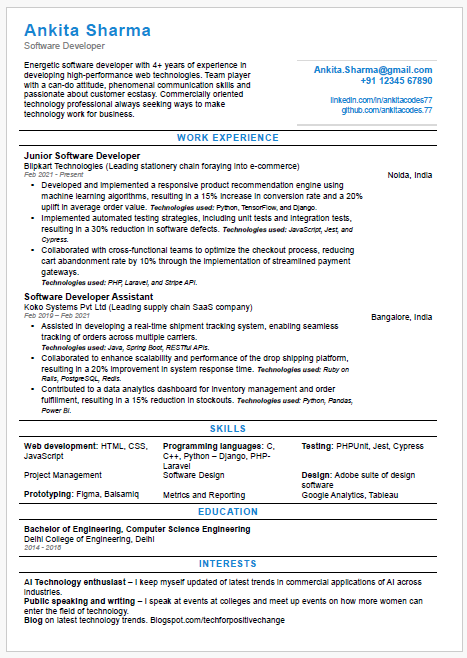Software Developer
Bachelor of Engineering, Computer Science Engineering

About this template
This is a very simple and professional resume which can effectively highlight your skills and experiences in a clear and concise manner.
This template is made in MS Word so, users can easily customize it to fit their specific needs.
Some important and useful technical skills for Software Developer
For a Software Developer, technical skills are crucial in building, testing, and maintaining software applications. Here are ten important and useful technical skills for a Software Developer:
1. Programming Languages:
Proficiency in multiple programming languages, such as Java, Python, C++, and JavaScript, is fundamental. Understanding the syntax, libraries, and frameworks of these languages allows developers to create efficient and effective software solutions across different platforms.
2. Data Structures and Algorithms:
Knowledge of data structures (like arrays, linked lists, and trees) and algorithms is essential for optimizing code performance. It helps in solving complex problems efficiently, managing resources, and ensuring the scalability of applications.
3. Version Control Systems:
Familiarity with version control systems like Git is crucial for collaboration and maintaining code history. It enables developers to track changes, work on different branches, and manage code integration and deployment processes effectively.
4. Database Management:
Understanding relational databases (SQL) and NoSQL databases is vital for managing and manipulating data. Skills in designing database schemas, writing queries, and optimizing database performance are key for backend development and data-driven applications.
5. Web Development:
Knowledge of front-end technologies (HTML, CSS, JavaScript) and back-end frameworks (Node.js, Django, Ruby on Rails) is important for developing web applications. This includes understanding responsive design, cross-browser compatibility, and web security practices.
6. Software Development Methodologies:
Familiarity with methodologies like Agile, Scrum, and DevOps is important for managing the software development lifecycle. These methodologies promote collaboration, iterative development, and continuous integration/continuous deployment (CI/CD).
7. Testing and Debugging:
Proficiency in testing techniques (unit testing, integration testing, and automated testing) is critical for ensuring software quality. Debugging skills are also necessary for identifying and resolving issues in code efficiently.
8. Cloud Computing:
Understanding cloud platforms like AWS, Azure, and Google Cloud is increasingly important. Skills in cloud architecture, deployment, and services like databases, storage, and machine learning can enhance a developer’s ability to build scalable and resilient applications.
9. Security Best Practices:
Awareness of security principles and practices is essential to protect applications from vulnerabilities. This includes knowledge of secure coding practices, encryption, authentication, and authorization mechanisms.
10. API Development and Integration:
Experience with RESTful APIs and SOAP is important for enabling communication between different software components. Understanding how to create, consume, and secure APIs is key for building interconnected systems and services.
Conclusion:
These technical skills enable Software Developers to create robust, efficient, and secure applications that meet user needs and business requirements. They also help in staying adaptable to the ever-evolving technology landscape.